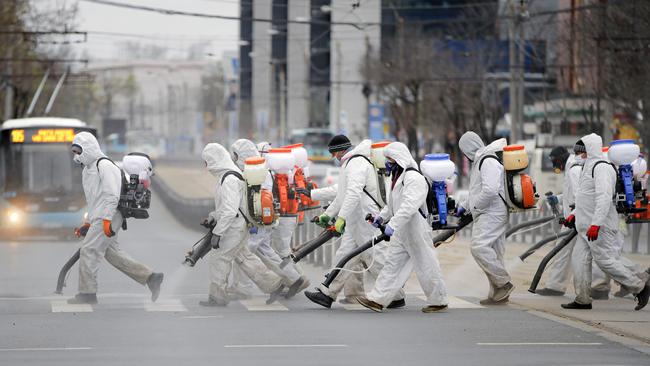Coronavirus: hospitals not built to cope with pandemics
Some of the world’s best health systems are remarkably ill-equipped to handle a pandemic.

As increasing numbers of European hospitals buckle under the strain of tens of thousands of coronavirus patients, the crisis has exposed a surprising paradox: some of the world’s best health systems are remarkably ill-equipped to handle a pandemic.
Outbreak experts say Europe’s hospital-centric systems, lack of epidemic experience and early complacency are partly to blame for the pandemic’s catastrophic tear across the continent.
“If you have cancer, you want to be in a European hospital,” said Brice de le Vingne, who heads COVID-19 operations for Doctors Without Borders in Belgium.
“But Europe hasn’t had a major outbreak in more than 100 years, and now they don’t know what to do.”
The World Health Organisation scolded countries last week for “squandering” their chance to stop the virus from gaining a foothold, saying countries should have reacted more aggressively two months ago, including implementing wider testing and stronger surveillance measures.
Dr de le Vingne and others say Europe’s approach to combating the new coronavirus was initially too lax and severely lacking in epidemiological basics like contact tracing.
During outbreaks of Ebola, including Congo’s most recent one, officials released daily figures for how many contacts were followed, even in remote villages paralysed by armed attacks.
After the new coronavirus emerged late last year, China dispatched a team of about 9000 health workers to chase thousands of potential contacts in the city of Wuhan every day. But in Italy, officials in some cases have left it up to ill patients to inform their potential contacts that they had tested positive and resorted to mere daily phone calls to check in on them. Spain and Britain have both declined to say how many health workers were working on contact tracing or how many contacts were identified at any stage in the outbreak.
“We are really good at contact tracing in the UK, but the problem is we didn’t do enough of it,” said Bharat Pankhania, an infectious diseases physician at the University of Exeter, in southwestern England.
As cases began picking up speed in Britain in early March, Dr Pankhania and others desperately pleaded for call centres to be transformed into contact tracing hubs. That never happened, in what Dr Pankhania calls “a lost opportunity”.
He said that while Britain has expertise in treating critical care patients with respiratory problems, such as severe pneumonia, there are too few hospital beds to cope with the exponential surge of patients during a pandemic.
Elsewhere, the fact that healthcare workers and hospital systems have little experience with rationing care because European hospitals are generally so well resourced is now proving problematic.
“Part of the issue is that Italian doctors are getting very distressed to make decisions about which patients can get the ICU bed because normally they can just push them through,” said Robert Dingwall, of Nottingham Trent University.
In a departure from their normal role as donors who fund outbreak responses in poorer countries, nations including Italy, France and Spain are now on the receiving end of emergency aid.
Doctors in Bergamo, the epicentre of Italy’s outbreak, described the new coronavirus as “the Ebola of the rich” in an article in the journal NEJM Catalyst Innovations in Care Delivery, warning that health systems in the West were at risk of being as overrun by COVID-19 as West African hospitals were in the devastating 2014-16 Ebola outbreak.
“Western health systems have been built around the concept of patient-centred care, but an epidemic requires a change of perspective towards community-centred care,” they wrote.
That model of community care is more typically seen in countries in Africa or parts of Asia, where hospitals are reserved for only the very sickest patients and far more patients are isolated or treated in stripped-down facilities — similar to the field hospitals being hastily built across Europe and the US.
Some outbreak experts said European countries badly miscalculated their ability to stop the new coronavirus.
AP



To join the conversation, please log in. Don't have an account? Register
Join the conversation, you are commenting as Logout